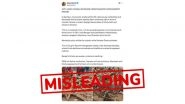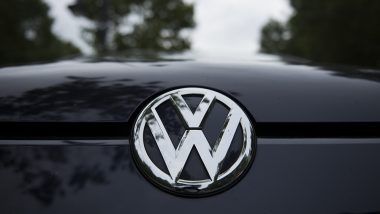Braunschweig, September 30: Car behemoth Volkswagen will face a German court Monday, as hundreds of thousands of owners of manipulated diesel cars demand compensation four years after the country's largest post-war industrial scandal erupted.
The first hearing in what is likely to be a grinding, years-long trial opens at 10 am (0800 GMT) in Brunswick, around 30 kilometres (19 miles) from VW headquarters in the northern city of Wolfsburg. Volkswagen Emission Scandal: National Green Tribunal Slaps A Fine of Rs 500 Crore on German Car Maker.
Around 450,000 people have joined a first-of-its-kind grouped proceeding, introduced by lawmakers after the "dieselgate" emissions cheating scandal broke in 2015.
Consumer rights group VZBV, representing the plaintiffs, says the German carmaker deliberately harmed buyers by installing motor control software that allowed vehicles to pollute far more on the road than under lab conditions.
The trial is Germany's largest so far in the tentacular diesel scandal, which last week saw VW chief executive Herbert Diess charged with market manipulation over his role.
- 50 questions for judges -
In the mass lawsuit, the most important of around 50 questions for judges is whether Volkswagen "caused harm" by acting "dishonestly".
Klaus Mueller of VZBV said he is "convinced" the car firm did, while VW says "clients did not suffer harm".
"Hundreds of thousands of cars are used" on the roads without problem, VW lawyer Martine de Lind van Wijngaarden said.
Even if judges find in favour of plaintiffs, there will not be an immediate compensation payment.
Rather, every owner registered in the trial will have to claim individually.
VW thinks a final judgement could arrive in 2023 at the earliest, if the case is appealed all the way to the Federal Court of Justice.
Individual proceedings could then take at least another year -- in the court of first instance.
By then, the cars' market value could have eroded to a negligible amount, making a buyback cheaper for the firm.
To avoid such delays, the VZBV says it is "open" to an out-of-court settlement but "in that case, VW would have to pay a significant sum after all," Mueller told AFP.
Given the wide variety of cases under the group action umbrella, VW finds a mass settlement "hard to imagine".
In early July, judges noted in a preliminary opinion that some owners listed among the plaintiffs were living abroad.
That could mean German law does not apply to them.
Volkswagen said two percent of those listed live abroad and 10 percent are duplicate entries.
Alongside the grouped proceeding, 61,000 individual lawsuits have been filed in Germany, and some have already led to out-of-court settlements.
- 30 billion euros -
Since 2015, when Volkswagen admitted to manipulating 11 million vehicles worldwide to fool emissions tests, the scandal has cost the group over 30 billion euros ($33 billion) in fines, compensation and legal costs.
Most of that sum -- $22 billion -- has gone to the US, while in Germany VW has so far paid just 2.3 billion dollars spread across three fines.
Alongside car owners, investors are claiming damages for losses they suffered when the group's share price plummeted after it came clean.
And earlier this week, chief executive Herbert Diess and supervisory board chief Hans Dieter Poetsch were charged with market manipulation.
Former chief executive Martin Winterkorn, who stepped down over the scandal, has been also charged with fraud.
Away from the legal battlegrounds, "dieselgate" has sped up the fuel's decline from its status as lower-carbon alternative to petrol, favoured with government subsidies.
In Germany, its market share among new registrations has fallen from 46 to 33 percent, and the level of nitrogen oxides (NOx) emitted by the cars risks earning them bans from some city centres.
The diesel scandal is "part of the group's history" just like the famous Beetle and Golf models, says VW brand chief Ralf Brandstaetter.
But he adds the company has "profoundly changed", investing 30 billion euros in a new electric range to "regain society's respect."
"The diesel crisis was a catalyst for our transformation," Brandstaetter told AFP in a recent interview.
(The above story first appeared on LatestLY on Sep 30, 2019 09:10 AM IST. For more news and updates on politics, world, sports, entertainment and lifestyle, log on to our website latestly.com).













 Quickly
Quickly


